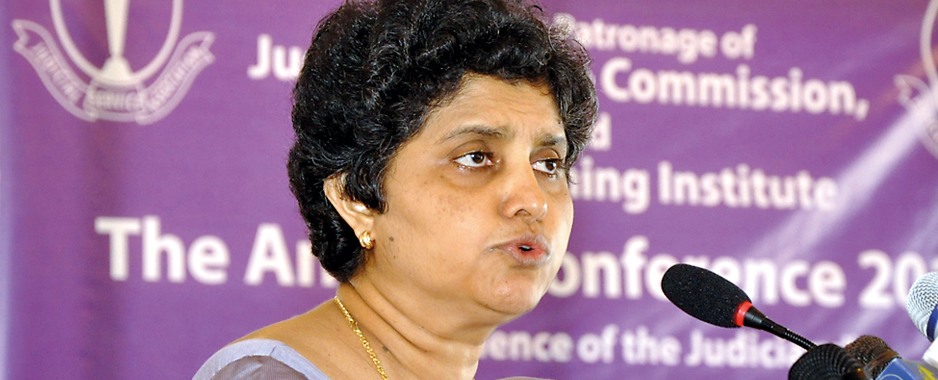News
The worst judge is one who succumbs to pressure: CJ
View(s):18th Amendment to the Constitution is a national calamity that has made the hegemonic Executive President a juggernaut: Retd. SC Judge Wigneswaran
By Namini Wijedasa
“The worst judge is not merely one who is deaf, but one who succumbs to pressure,” Chief Justice (CJ) Shirani Bandaranayake said yesterday.
Addressing the Annual Judges’ Conference of the Judicial Service Association (JSA), CJ Bandaranayake quoted Walter Bagehot, a political analyst and editor. He commented in 1867 that, “the worst judge is a deaf judge”.
“I believe it is apt to amend his sentiment in relation to this crucial judicial and socio-economic juncture of our country,” she said. “The worst judge is not merely one who is deaf, but one who also succumbs to pressure.”

Chief Justice Bandaranayake addressing the gathering
“It is as much the responsibility of the judge to stand above it, without any fear or favour, as it is the responsibility of the Legislature, the Executive and the society at large to ensure that they are capable of discharging their Constitutional duties without undue, adverse intimidation,” she continued.
The conference was held in Colombo on the theme of ‘Independence of the Judiciary’. CJ Bandaranayake did not allude directly to the impeachment motion against her, but repeatedly referred to the importance of a fair trial.
“Fairness in dispensing of justice is the foundation upon which trust has been established upon our noble profession amidst society,” she pointed out. “It is upon this basis that we presume a person to be innocent until he is proved guilty.” “The Constitution states that, any person charged with an offence, shall be entitled to be heard at a fair trial by a competent court,” she reiterated.
The CJ also said that, in order to uphold independence, a judge “must be willing and able to make many sacrifices. He must stand firm through any and all apprehensions and want of personal benefits in the name of justice,” she opined.
“If the ‘powers that be’ had felt threatened by the Annual Conference of Judges, it was a sign of fear and weakness on their part,” retired Supreme Court Judge C.V. Wigneswaran said in his keynote address.
“That is a sign that what you do and say matters,” he stressed. “That is a sign that together you are strong. That is a sign that the tide has turned, that a battle has been won and that, intrinsic independence shines strong amongst you, the younger members of the judiciary.”
Justice Wigneswaran acknowledged that judges were carrying out their duties amidst “much stress”. “Your personal security is at stake,” he said. “Interference extends not just to your duties, but to other areas as well. Even this conference was sabotaged.”
But, he said, he saw “a silver lining at the end of all this. You must continue performing your duties, however challenging they are, bearing in mind, the need to be balanced,” he urged. “You must continue to remain together, for you can be certain that, there will be moves to split asunder the unity.
You must continue this historic struggle for extrinsic independence. Not just for the judiciary, but for democracy.”
Justice Wigneswaran decried the concentration of power in the Executive. The Cabinet of Ministers lost its importance after the Second Amendment to the Constitution that transferred all Executive power to an Executive President. “Still the Cabinet is sterile and impotent,” he said. “You hardly know these days whether a Cabinet of Ministers exists, and what its views are!”
He called the 18th Amendment to the Constitution “a national calamity.” Among other things, it ended Presidential term limits and increased the Executive’s control over appointments. “As we traced at the outset, the Executive was already hegemonic,” he said, wryly. “Now the hegemonic Executive President had been made a juggernaut!”
“The effects of the 18th Amendment will only grow with time,” Justice Wigneswaran warned. “The drama taking front pages in the newspapers these days, is only proof of such demoralising effects,” he explained.
“By passing the 18th Amendment, Sri Lanka has destroyed what democratic framework that was in place, rather than improving it,” he said. “When the Supreme Court decided on this issue, it ought to have borne in mind the precarious balance of power, and ought to have realised that changes of this nature change the essential structure of the Constitution and, as such, the very nature of a democracy.”
Appeal Court Judge Justice A.W.A. Salam also addressed the gathering. He spoke on the manner in which judges must behave in order to dispense justice fairly.
Related Articles:
JUDICIAL SERVICE ASSOCIATION OF SRI LANKA - ANNUAL CONFERENCE 2012
Follow @timesonlinelk
comments powered by Disqus

















